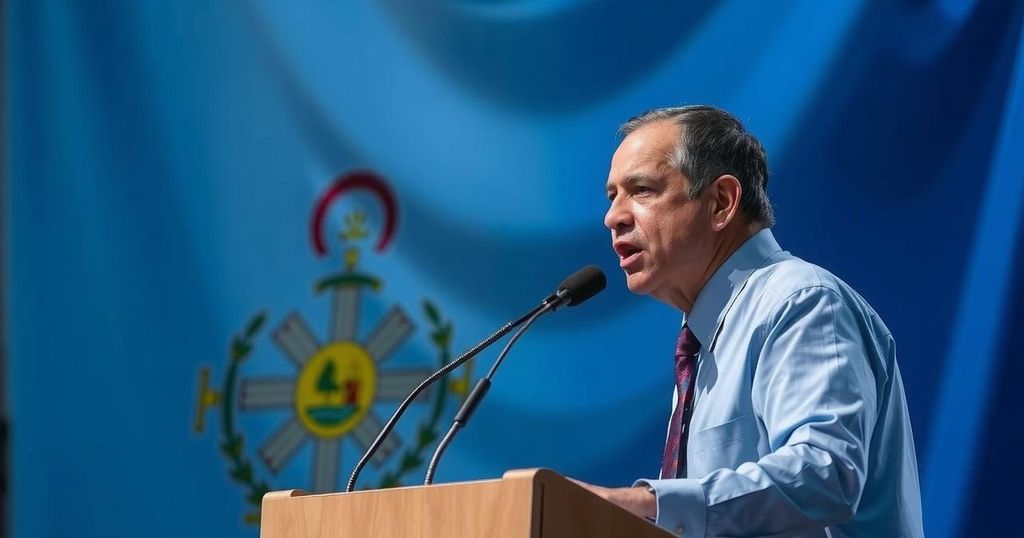Uruguay is facing a presidential run-off on November 24 between Yamandu Orsi of the Frente Amplio party and Alvaro Delgado of the Partido Nacional, following initial voting results showing Orsi in the lead. Preliminary projections indicate that both candidates have overlap in policy positions, diverging from regional political trends. Additionally, voters rejected referendum measures aimed at adjusting retirement ages and police operation rules.
Uruguay is poised for a presidential run-off slated for November 24, as the initial electoral results indicate a contest between Yamandu Orsi, a 57-year-old former history teacher and mayor representing the centre-left Frente Amplio party, and Alvaro Delgado, a 55-year-old veterinarian from the centre-right Partido Nacional. Orsi emerged as the frontrunner with approximately 43.2 percent of the votes, while Delgado secured around 28 percent, according to estimates from Equipos Consultores. Andres Ojeda, a media-savvy lawyer, followed in third place with 15.5-16 percent of the vote. This election has deviated from broader regional trends, maintaining a political landscape largely characterized by moderate approaches, as both principal candidates present overlapping policy positions. Furthermore, voters in the nation of 3.4 million citizens participated in referendums regarding proposals to decrease the retirement age and adjust police regulations for nighttime raids; however, exit polling suggests these measures were rejected. Political analysts note that the electorate’s satisfaction with the current government’s performance may be contributing to this lack of distinct partisan divide, in contrast to the pronounced ideological fluctuations evident in neighboring countries such as Argentina and Brazil. Despite President Luis Lacalle Pou’s conservative coalition achieving high approval ratings, concerns surrounding escalating violent crime, particularly related to drug trafficking, remain a critical issue for voters. With Lacalle Pou unable to seek a second consecutive term due to constitutional restrictions, a potential victory for Orsi could bring about a shift back to leftist governance in Uruguay, reminiscent of the leadership experienced under former president José Mujica. Mujica, who has been campaigning despite health issues, reaffirmed his continued support for Orsi, indicating the likelihood of an ideological realignment in the upcoming run-off.
The political landscape in Uruguay has generally been marked by a blend of centre-left and centre-right parties, with recent trends indicating a shift in voter aspirations and concerns. With a population of approximately 3.4 million, Uruguay has often stood apart from its Latin American neighbors, where polarizing right-left divides have become more pronounced. The current political environment reflects a mix of satisfaction with governmental performance—especially in terms of employment and wage growth—paired with growing anxiety regarding crime, particularly drug-related violence. The involvement of influential figures such as former President José Mujica lends a historical perspective that could impact the upcoming elections, given his legacy and ongoing presence in the political discourse. Orsi’s alignment with Mujica’s policies could potentially appeal to constituents seeking a return to leftist governance, contrasting with the previous conservative tenure under Lacalle Pou.
In conclusion, Uruguay’s presidential election results indicate a forthcoming run-off that embodies a notable departure from the extreme political shifts seen in other Latin American nations. Candidates Yamandu Orsi and Alvaro Delgado represent a central choice for voters, as both parties reflect overlapping policy positions. With the populace expressing a rejection of recent referendums and significant concerns regarding crime, the political future of Uruguay will hinge on the choices made in the upcoming run-off, which may see a return to leftist leadership under Orsi or the consolidation of centre-right governance with Delgado.
Original Source: www.aljazeera.com






